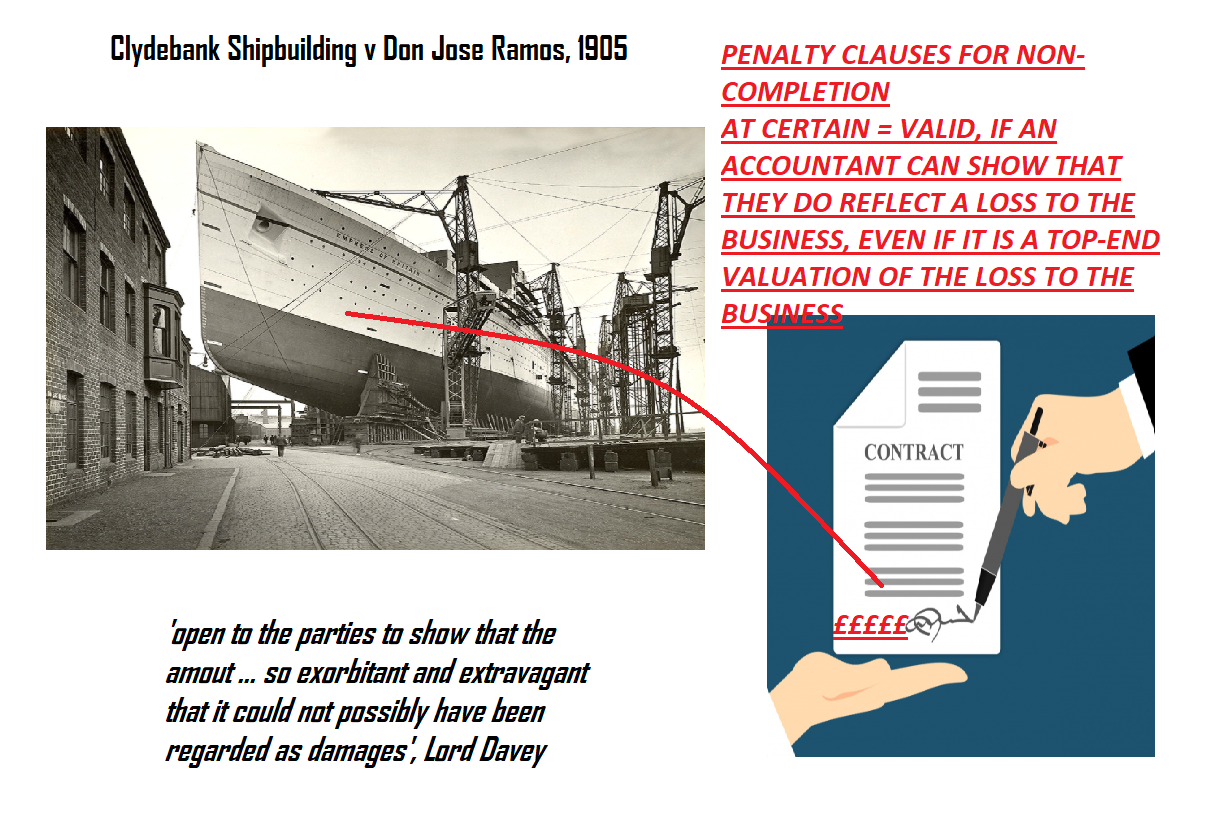Clydebank Engineering & Shipbuilding Co Ltd v Don Jose Ramos Yzquierdo y Castaneda [1905] A.C., 6-11, [1904] UKHL 3
Citation:Clydebank Engineering & Shipbuilding Co Ltd v Don Jose Ramos Yzquierdo y Castaneda [1905] A.C., 6-11, [1904] UKHL 3
Rule of thumb:If a liquidated damages clause is excessive but not wholly unreasonable is it enforceable? Yes. Penal means that the sum of the liquidated damages is more than just excessive, and it is completely unjustifiable.
Background facts:
The facts of this case were the Spanish Government agreed a contract with Clydebank Engineering to build ships for them. The contract provided for heavy financial reparation to be paid if delivery was late. Clydebank were late with the construction of the ships, and the Spanish Government sought to enforce the clause with the stipulated sum for lateness.
Parties argued:
Clydebank argued that the clauses were unfair penalty clauses which were not valid clauses. The Spanish Government in response only provided a rough explanation of how this was calculated, without going into great detail.
Judgment:
The Court in this case affirmed that this was prima facie a liquidated damages clause and not a penalty clause. It was clarified that if someone uses a liquidated damages clause they only have to provide broad evidence of how they arrived at their figure to justify them. If the other party wants to then challenge the veracity of them they have to provide detailed evidence of this to do so.

Ratio-decidendi:
‘... taken as an established principle in the law of Scotland that, if you find a sum of money made payable for the breach, not of an agreement generally which might result in either a trifling or a serious breach, but a breach of one particular stipulation in an agreement, and when you find that the sum payable is proportioned to the amount if I may so call it, or the rate of the non-performance of the agreement – for instance, if you find that it is so much per acre for ground which has been spoilt by mining operations, or if you find, as in the present case, that it is so much per week during the whole time for which the non-delivery of vessels beyond the contract time is delayed – then you infer that prima facie the parties intended the amount to be liquidate damages and not penalty. I say ‘prima facie’ because it is always open to the parties to show that the amount named in the clause is so exorbitant and extravagant that it could not possibly have been regarded as damages for any possible breach which was in the contemplation of the parties, and that is a reason for holding it to be a penalty and not liquidated damages notwithstanding the considerations to which I have alluded', Lord Davey, 'open to the parties to show that the amount ... so exorbitant and extravagant that it could not possibly have been regarded as damages', Lord Davey.
Warning: This is not professional legal advice. This is not professional legal education advice. Please obtain professional guidance before embarking on any legal course of action. This is just an interpretation of a Judgment by persons of legal insight & varying levels of legal specialism, experience & expertise. Please read the Judgment yourself and form your own interpretation of it with professional assistance.

